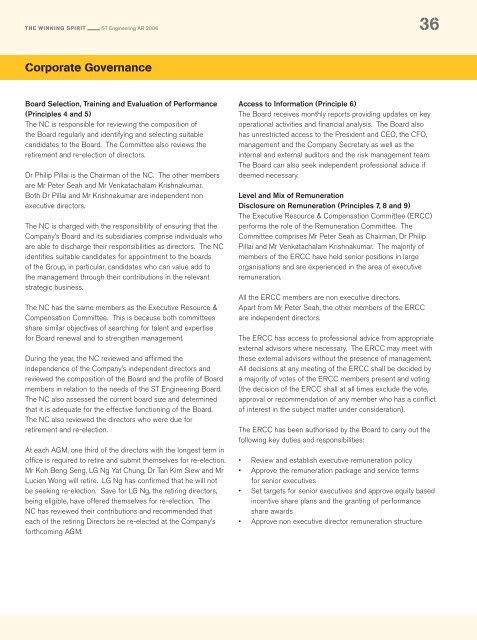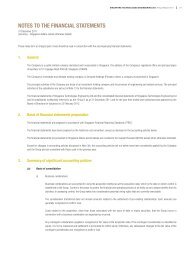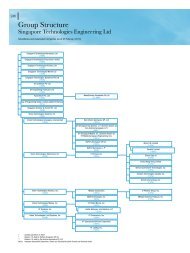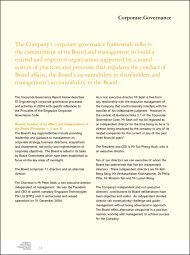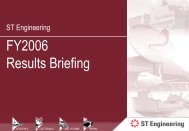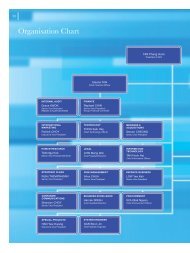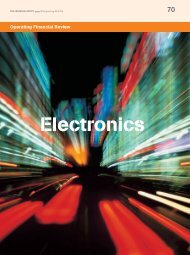Full Annual Report 2006 - Singapore Technologies Engineering
Full Annual Report 2006 - Singapore Technologies Engineering
Full Annual Report 2006 - Singapore Technologies Engineering
You also want an ePaper? Increase the reach of your titles
YUMPU automatically turns print PDFs into web optimized ePapers that Google loves.
THE WINNING SPIRIT ST <strong>Engineering</strong> AR <strong>2006</strong> 36<br />
Corporate Governance<br />
Board Selection, Training and Evaluation of Performance<br />
(Principles 4 and 5)<br />
The NC is responsible for reviewing the composition of<br />
the Board regularly and identifying and selecting suitable<br />
candidates to the Board. The Committee also reviews the<br />
retirement and re-election of directors.<br />
Dr Philip Pillai is the Chairman of the NC. The other members<br />
are Mr Peter Seah and Mr Venkatachalam Krishnakumar.<br />
Both Dr Pillai and Mr Krishnakumar are independent non<br />
executive directors.<br />
The NC is charged with the responsibility of ensuring that the<br />
Company’s Board and its subsidiaries comprise individuals who<br />
are able to discharge their responsibilities as directors. The NC<br />
identifies suitable candidates for appointment to the boards<br />
of the Group, in particular, candidates who can value add to<br />
the management through their contributions in the relevant<br />
strategic business.<br />
The NC has the same members as the Executive Resource &<br />
Compensation Committee. This is because both committees<br />
share similar objectives of searching for talent and expertise<br />
for Board renewal and to strengthen management.<br />
During the year, the NC reviewed and affirmed the<br />
independence of the Company’s independent directors and<br />
reviewed the composition of the Board and the profile of Board<br />
members in relation to the needs of the ST <strong>Engineering</strong> Board.<br />
The NC also assessed the current board size and determined<br />
that it is adequate for the effective functioning of the Board.<br />
The NC also reviewed the directors who were due for<br />
retirement and re-election.<br />
At each AGM, one third of the directors with the longest term in<br />
office is required to retire and submit themselves for re-election.<br />
Mr Koh Beng Seng, LG Ng Yat Chung, Dr Tan Kim Siew and Mr<br />
Lucien Wong will retire. LG Ng has confirmed that he will not<br />
be seeking re-election. Save for LG Ng, the retiring directors,<br />
being eligible, have offered themselves for re-election. The<br />
NC has reviewed their contributions and recommended that<br />
each of the retiring Directors be re-elected at the Company’s<br />
forthcoming AGM.<br />
Access to Information (Principle 6)<br />
The Board receives monthly reports providing updates on key<br />
operational activities and financial analysis. The Board also<br />
has unrestricted access to the President and CEO, the CFO,<br />
management and the Company Secretary as well as the<br />
internal and external auditors and the risk management team.<br />
The Board can also seek independent professional advice if<br />
deemed necessary.<br />
Level and Mix of Remuneration<br />
Disclosure on Remuneration (Principles 7, 8 and 9)<br />
The Executive Resource & Compensation Committee (ERCC)<br />
performs the role of the Remuneration Committee. The<br />
Committee comprises Mr Peter Seah as Chairman, Dr Philip<br />
Pillai and Mr Venkatachalam Krishnakumar. The majority of<br />
members of the ERCC have held senior positions in large<br />
organisations and are experienced in the area of executive<br />
remuneration.<br />
All the ERCC members are non executive directors.<br />
Apart from Mr Peter Seah, the other members of the ERCC<br />
are independent directors.<br />
The ERCC has access to professional advice from appropriate<br />
external advisors where necessary. The ERCC may meet with<br />
these external advisors without the presence of management.<br />
All decisions at any meeting of the ERCC shall be decided by<br />
a majority of votes of the ERCC members present and voting<br />
(the decision of the ERCC shall at all times exclude the vote,<br />
approval or recommendation of any member who has a conflict<br />
of interest in the subject matter under consideration).<br />
The ERCC has been authorised by the Board to carry out the<br />
following key duties and responsibilities:<br />
• Review and establish executive remuneration policy<br />
• Approve the remuneration package and service terms<br />
for senior executives<br />
• Set targets for senior executives and approve equity based<br />
incentive share plans and the granting of performance<br />
share awards<br />
• Approve non executive director remuneration structure


